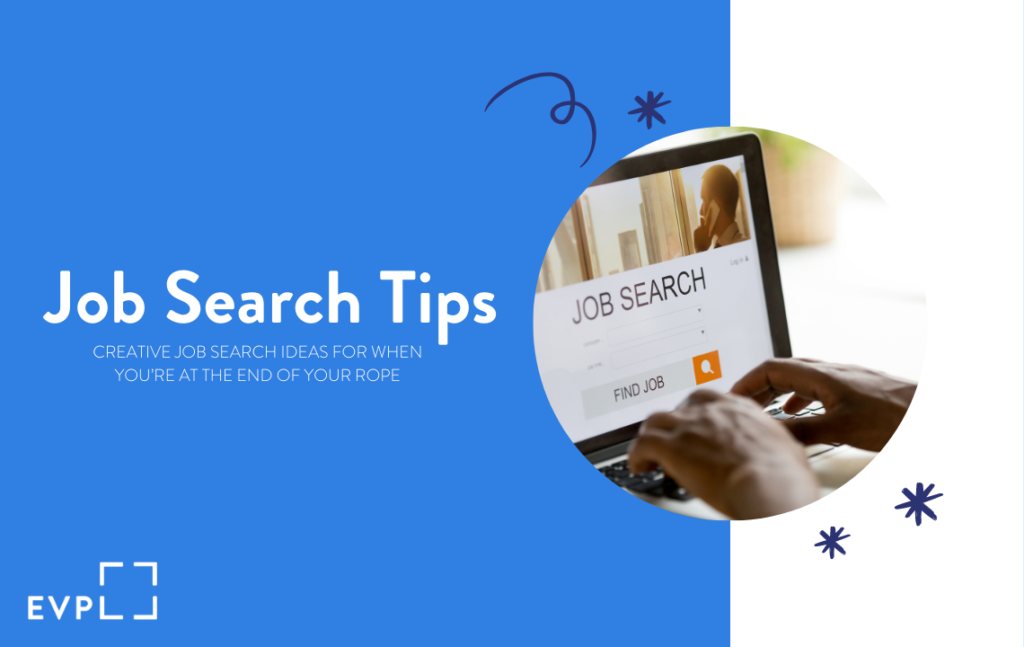Creative job search ideas for when you’re at the end of your rope
We’ve all been there. We fill out yet another online application and send it into the void, only to wait for weeks with no results. Maybe you’ve read articles, used EVPL’s job seeker tools, gone through your resume with a fine-toothed comb, and you still haven’t landed a job – let alone an interview.
While this problem isn’t isolated to the COVID-19 pandemic, it certainly isn’t being helped by it. And with the numbers of cases rising in Indiana and across the country, finding a job is both more critical and more difficult than usual.
But before you throw your laptop out the window or shred your application in the garbage disposal, here are a few less-conventional, more creative tips for getting your job searching game back on track.

Role play as the employer
To know the ideal applicant, you must first be the ideal applicant. LinkedIn is a phenomenal networking tool, but it can also be used for research. Connect with individuals who have a job description you’re intrigued by. Look through their profile, especially their work history. What education, opportunities, and positions have led them to where they are now? Are there any similarities between your credentials and theirs? Even if your work history looks nothing alike, take a moment to consider what transferable skills you both share – maybe you’ve never worked in an HR position, but like many others who have the job you want, you’ve worked in customer service for years.
Asking for advice or suggestions on how to land a similar job can be intimidating, but most of the time, people like to help. If they’re passionate about their work and you approach them with an honest, open mind, you could find plenty of unique resources or solutions to your job search that you hadn’t even considered before. Maybe it really is your dream job, or maybe it’s not – either way, you’ll be better informed to make a decision than before.
Ask for an informational interview (whether you get a real interview or not)
The best way to learn about a job is to actually do it.
COVID-19 may discourage job shadowing in person, but conducting an informational interview can be a great way to narrow down specific job skills, duties, and gain insight into what is desired from an applicant. Not ready to commit to transitioning careers, but still interested in someone’s position? There’s no better way to get a feel for something than learning about that position’s day to day and year to year experiences.
If you’ve already applied for an open position, consider requesting an informational interview as a way to show your commitment and interest. That way, even if you are not selected for an interview, you have not only formed a lasting impression, you are setting yourself up for success for future application opportunities.
A few tips
- Use your resources: network whenever possible, or use an informational interview as the basis for forming a new network connection
- Branch out: engage related industries or competitors of your preferred employers; you may even find a new career path you didn’t know existed
- Do not forget to send a thank you card or follow up: it might be a small thing, but not only will it be appreciated, it also makes you more memorable and likely to form a lasting impression
Create something
When you are one application out of fifty or more, standing out can become important. Depending on your industry, one unique choice could be to create a work sample. Almost all online job applications have a section for additional attachments – this is your chance to include anything else that sets you apart from the crowd.
Depending on your field, this could be as simple as sharing an existing portfolio, or it could require some deeper thought. Spreadsheets, sample lesson plans, a proposal for a new social media campaign – what you choose is up to you. The goal is to have an independently created supplement to your application that actively demonstrates your skills and clearly provides a benefit to the position and the company.
To create something valuable for an application, knowing your industry and what sort of results are expected from the positions you are applying for is essential. Take your time and consider how to leverage your transferable skills to make a work sample that matches your job searching goals. Even if you feel what you make in the end isn’t suitable for inclusion on an application form, it could still be usable when you do land a job. At the very least, creating something can still assist you in learning how to streamline your skills, and clarifying how the position operates.
Conclusion
Not all of these suggestions will appeal to you – or apply to your situation. But hopefully at least one will, and encourage you to continue your job search despite the disappointment, frustration, and seemingly endless periods of waiting for a reply.
If you feel you need to brush up on your job applying skills, whether you want an outsider’s opinion on your resume, support in writing your cover letter, or a way to get your nerves out by practicing for an interview, the library has you covered. Try Brainfuse, EVPL’s free online service that assists job seekers find success. Another option is to Book-a-Librarian through evpl.org, where you can be matched with an informational professional for some one-on-one help. No matter what stage of the job search you’re in, EVPL is here to help you.
Need additional support?
200 SE Martin Luther King Jr. Blvd
Evansville, Indiana 47713
Administration: ceo@evpl.org
Card & Account: circulation@evpl.org
Feedback & Ideas: marketing@evpl.org



